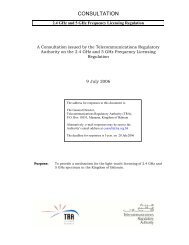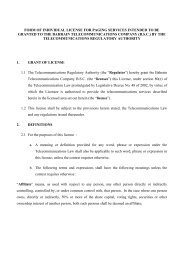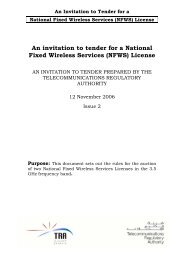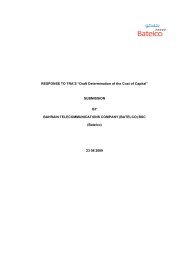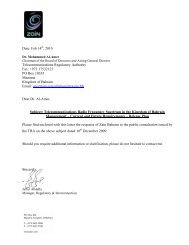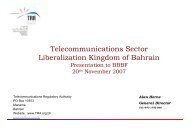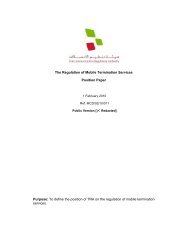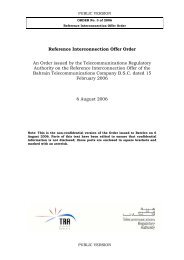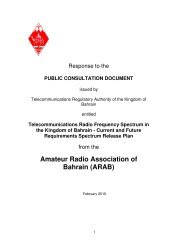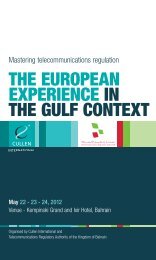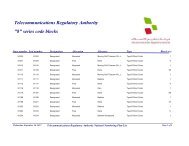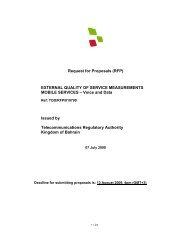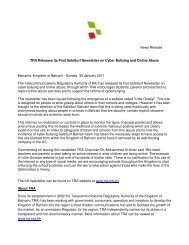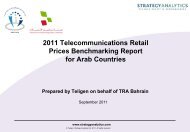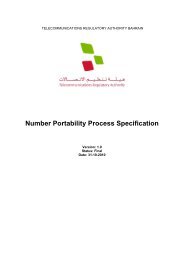Annual Report 2008 - TRA - Telecommunication Regulatory Authority
Annual Report 2008 - TRA - Telecommunication Regulatory Authority
Annual Report 2008 - TRA - Telecommunication Regulatory Authority
Create successful ePaper yourself
Turn your PDF publications into a flip-book with our unique Google optimized e-Paper software.
20 <strong>TRA</strong> <strong>Annual</strong> <strong>Report</strong> <strong>2008</strong> Building a Competitive Market<br />
On 19 October <strong>TRA</strong> issued a consultation document proposing that, through the establishment of a central database,<br />
all licensed operators would be required to allow customers to transfer their numbers to other operators. Number<br />
portability would be available to both mobile and fixed line customers. No operator would be allowed to engage in<br />
any direct activity to dissuade a customer from moving.<br />
There were two main aims of these proposals. First consumers would be empowered to exercise free choice to select<br />
any operator for their fixed or mobile service. And second it would encourage operators to improve their services in<br />
order to keep their customers.<br />
National Numbering Plan<br />
The way numbers are used and allocated to operators can either support or be a barrier to innovative and competitive<br />
telecommunications services. The National Numbering Plan therefore needs to keep pace with technological change,<br />
the evolution of new services and increasing competition.<br />
In June <strong>TRA</strong> issued a revised Plan for public comment. Following this consultation and a series of workshops with<br />
the industry, the updated National Numbering Plan was released and from 18 September <strong>TRA</strong> began accepting<br />
applications for new number ranges.<br />
Among other changes, the Plan opened up new number ranges in a technologically neutral manner for operators<br />
offering services over fixed and mobile networks, and for services using technologies such as Voice over Internet<br />
Protocols (VoIP). The new number ranges, in effect, are for use by operators offering any service over any technology.<br />
The Plan was designed to be forward looking, to accommodate not only existing, but also future technologies, and<br />
to provide a migration path to the fully converged telecommunications environment that lies ahead.<br />
<strong>TRA</strong> also ensured that numbers continued to give consumers an indication, by looking at the first two digits, of<br />
the level of charge they are likely to incur - for example freephone, national call rates or premium charges for<br />
information type services.<br />
Emergency service short codes were also extended to support new Government initiatives on routing emergency<br />
calls direct to specialist agencies such as the Coastguard. The revised Plan also introduced a new series of short<br />
codes, at varying rates, for calls to information services, taxi companies, restaurants and similar operations.<br />
Spectrum issues<br />
National Spectrum Planning and Allocation Policy<br />
In April <strong>TRA</strong> brought together organisations concerned with the planning and allocation of radio frequency<br />
spectrum in the Kingdom. Representatives attended from the Ministry of the Interior, the Bahrain Defence Force,<br />
Civil Aviation Affairs, Bahrain TV Corporation and the General Organisation of Seaports. The aim was to extend the<br />
National Spectrum Planning and Allocation Policy beyond telecommunications spectrum usage only and so ensure<br />
the efficient use of radio frequency, with reduced risk of interference between user groups including from nearby<br />
countries. <strong>TRA</strong> had recognised the need to balance the requirements of the different user groups in the policy and<br />
to support the development of security, social, economic and safety activities in the Kingdom.<br />
Earlier in the year consultants InterConnect Communication (ICC) had been appointed to develop the policy and,<br />
at the meeting in April, they presented an assessment of the current situation and their recommendations for the<br />
future.<br />
In October, the Minister responsible for the telecommunications sector issued a resolution to establish a permanent<br />
Spectrum Strategy and Coordination Committee (SSCC). The committee aims to facilitate the coordination of<br />
spectrum requirements and to support the development and maintenance of the National Frequency Plan for all<br />
radio spectrum resources in the Kingdom.<br />
SSCC is chaired by Sheikh Salman bin Mohammed Al Khalifa, Director General of Information Technology at the<br />
Central Informatics Organisation. The other nine members represent the different sectors that are major users of<br />
spectrum:



